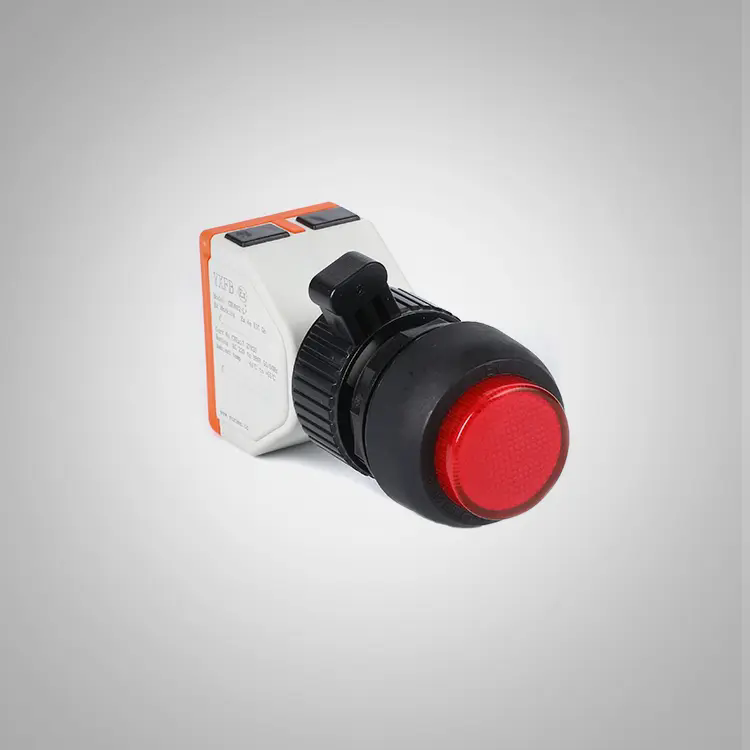What Makes Lamp LED with Pilot the Ideal Choice ?
2025-10-09
In today’s fast-paced industrial and commercial environments, visibility, reliability, and safety are crucial. Whether in control panels, electrical cabinets, or machinery interfaces, operators depend on accurate visual feedback to monitor the system’s status. That’s where the Lamp LED with Pilot plays a vital role.
A Lamp LED with Pilot, also called a pilot indicator light, is an electrical component that signals operational status—whether a machine is on, off, or in fault mode. It combines the illumination of an LED lamp with a pilot function, offering bright, energy-efficient, and durable status indication for industrial systems.
Unlike traditional incandescent pilot lamps, LED types provide high brightness, longer lifespan, and lower power consumption. They also generate minimal heat and require little maintenance, making them a reliable choice in modern automation systems.
Why Lamp LEDs with Pilot Are Widely Used
-
Safety: Clearly indicate machine operation status to prevent accidental activation or shutdown.
-
Energy efficiency: LED technology consumes significantly less power than older lighting systems.
-
Durability: With shock and vibration resistance, they perform well even in demanding environments.
-
Customization: Available in multiple voltages, colors, and mounting sizes for diverse applications.
-
Compliance: Many models meet IEC and CE standards for electrical safety and performance.
From factories to marine control systems, Lamp LEDs with Pilot are indispensable indicators that enhance control precision and operational awareness.
What Are the Key Features and Technical Parameters of Lamp LED with Pilot?
To choose the right Lamp LED with Pilot, one must understand its technical parameters. These lamps are designed for flexibility and can be configured for different voltage systems, environments, and mounting conditions. Below is a detailed specification chart representing the most common industrial-grade models.
| Parameter | Specification Options |
|---|---|
| Rated Voltage | AC/DC 12V, 24V, 110V, 220V, 380V |
| Light Source Type | High-efficiency LED (single or bi-color) |
| Colors Available | Red, Green, Yellow, Blue, White, Dual-color (Red/Green) |
| Lamp Diameter | 16mm, 22mm, 25mm, 30mm (standard panel cutout sizes) |
| Luminous Intensity | 40–80 cd (depending on color and design) |
| Service Life | 30,000 – 50,000 hours (average LED life) |
| Body Material | Polycarbonate, Nylon, or Metal (Stainless Steel / Aluminum Alloy) |
| Operating Temperature | -25°C to +70°C |
| Ingress Protection (IP) | IP40, IP65, or IP67 for waterproof and dustproof models |
| Connection Type | Screw terminal / plug-in / solder terminal |
| Mounting Style | Panel mount with threaded fixing and lock nut |
| Certifications | CE, RoHS, UL, ISO9001 |
These parameters define not just the performance but also the longevity and adaptability of the Lamp LED with Pilot. Whether it’s used in automation panels, marine dashboards, or energy systems, choosing the right configuration ensures optimal efficiency and durability.
Additional Performance Highlights
-
Energy-Saving Design: Consumes up to 90% less power than traditional incandescent indicator lamps.
-
Clear Visual Output: Provides uniform brightness, even in bright industrial environments.
-
Long-Term Stability: LED technology ensures consistent performance without flickering or fading.
-
Fast Response Time: Lights up instantly upon circuit activation, improving real-time monitoring.
What Are the Practical Applications and Benefits of Lamp LED with Pilot?
Lamp LEDs with Pilot are used in a broad range of electrical and industrial equipment. Their role is simple but vital: they help operators quickly identify a machine’s status without the need for instruments or meters.
Common Industrial and Commercial Applications
-
Control Panels: Indicate operational or fault conditions in machinery, generators, and power systems.
-
Marine and Offshore Systems: With waterproof versions (IP67), they’re ideal for ship dashboards and coastal operations.
-
Power Distribution Boards: Show live circuit or phase status to help technicians identify issues instantly.
-
Automation Systems: Signal machine readiness, faults, or mode transitions in robotic and conveyor systems.
-
Transportation Equipment: Used in railway and aviation control systems for visual signaling.
-
Building Management Systems: Integrated into HVAC and lighting controls for centralized monitoring.
Benefits of Using Lamp LED with Pilot
-
Enhanced Safety and Clarity
The primary benefit is safety. A glowing red or green pilot lamp quickly informs operators of machine states, reducing the likelihood of human error. -
Reduced Maintenance Costs
With no filament to burn out, LED pilot lamps operate for tens of thousands of hours, eliminating frequent replacements. -
High Efficiency with Minimal Power Use
LED indicators consume only a fraction of the energy required by incandescent lamps, which is crucial for systems that operate continuously. -
Design Versatility
Available in multiple voltage options and mounting diameters, these lamps fit diverse design requirements. -
Improved Aesthetics
Sleek, modern appearances make them ideal for control panels where visual appeal and functionality are both important. -
Environmentally Friendly
LEDs contain no toxic materials and produce minimal waste heat, contributing to sustainability goals.
What Should You Know Before Selecting a Lamp LED with Pilot?
Choosing the correct model is essential to achieving stable performance and long lifespan. Here are some professional considerations to ensure compatibility with your system:
Key Selection Criteria
-
Voltage Compatibility
-
Check whether your system uses AC or DC voltage.
-
Ensure the rated voltage of the lamp matches your supply.
-
-
Color Indication Scheme
-
Red: Power ON or fault condition.
-
Green: Normal operation or system ready.
-
Yellow: Warning or standby.
-
Blue/White: Special function indicators (e.g., cooling system ON).
-
-
Environmental Conditions
-
Choose higher IP ratings (IP65–IP67) for outdoor or dusty environments.
-
For marine or chemical industries, select corrosion-resistant metal housings.
-
-
Mounting and Space Constraints
-
Panel cutout diameter must match the lamp’s body (16mm, 22mm, etc.).
-
Ensure sufficient space for wiring and heat dissipation.
-
-
Regulatory and Quality Assurance
-
Always look for certifications such as CE, RoHS, and UL to guarantee safety and compliance.
-
-
Longevity and Cost Efficiency
-
A high-quality LED lamp may cost more initially but saves on maintenance and replacement costs over time.
-
Installation Tips for Optimal Performance
-
Always disconnect power before installation or maintenance.
-
Avoid overtightening mounting nuts to prevent panel damage.
-
Use appropriate wire terminals for secure connections.
-
For multi-voltage systems, label lamp colors and functions clearly to prevent confusion.
Common FAQs About Lamp LED with Pilot
Q1: What causes a Lamp LED with Pilot to fail prematurely?
A: Early failure is often due to overvoltage, poor wiring connections, or excessive ambient temperature. Using a properly rated model and ensuring correct installation greatly extends service life.
Q2: What’s the difference between a Lamp LED with Pilot and a standard indicator light?
A: A Lamp LED with Pilot is specifically designed for industrial use, combining durability, high visibility, and long life. It typically includes enhanced housing protection and standardized mounting sizes for professional control panels.
What Makes Lamp LED with Pilot a Reliable Solution for the Future?
As industries continue to automate and prioritize efficiency, the Lamp LED with Pilot has become an indispensable component in electrical systems. Its combination of low energy consumption, long lifespan, and clear visual signaling makes it ideal for both traditional and advanced industrial environments.
At Yuxuan, we design and manufacture a full range of Lamp LEDs with Pilot built to deliver superior performance and reliability. Our products meet international safety standards, ensuring stable operation in control panels, machinery, and energy systems across industries.
Whether you need single-color, dual-color, or custom-designed pilot lamps, Yuxuan provides professional-grade solutions tailored to your specific requirements.
For detailed specifications, pricing, or customized configurations, contact us today and discover how Yuxuan can support your electrical and automation projects with trusted quality and technical excellence.



